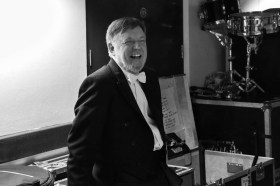To countless big kids around the world, The Jim Henson Company and its stable of felt and feathers are a cultural touchstone. You’d be hard pressed to find a thirty-something whose childhood memories didn’t star a Muppet or two.
Whether it’s Sesame Street, Fraggle Rock, The Muppet Show, the many Muppet movies, Labyrinth or The Dark Crystal, the imaginings of Jim Henson reach deep into the zeitgeist, drawing in bold on everything from mythology to music theatre.
Millions mourned Henson’s passing in 1990, at the tragically young age of 53. But his legacy lives on, under the expert hands of his son Brian (co-CEO of Henson Inc.) and an expansive team of talent anchored in Hollywood, London and New York.
Now, fans of the Henson trademark can catch Brian, a team of fellow puppeteers, and around 100 inhuman characters on stage as part of a new production, PUPPET UP! Uncensored. It’s just been on as part of the Melbourne Comedy Festival in Australia – but be warned – this show isn’t brought you to by the letter A or the number 5.
PUPPET UP! Uncensored follows the format of standard improv shows (actors on stage take audiences suggestions and use them to spontaneously generate characters, scenes and conflicts). But in this case, the actors have puppets to wield.
Brian is producer and creator of PUPPET UP!. He’s also part of the troupe, enjoying the anarchy with everyone else. He’s the chief creative brain behind cult sci-fi series Farscape, shot in Sydney, and was often in town to oversee its puppet stars.
More recently, he was in Melbourne directing a segment of the Stephen King TV mini-series Nightmares and Dreamscapes. Henson’s chapter, Battleground, starred William Hurt as a lone hit man besieged by bucket loads of teeny military toys in his apartment. It contained not a word of dialogue, yet was arguably the most gripping narrative of the bunch.
PUPPET UP! is decidedly more off-the-cuff.
Henson and company have officially been working on the project for about two years, but the show was never intended for public consumption. It began as the opposite, a consciously insular exercise in professional development.
“I wanted to sharpen up the skills of our puppeteers, help them stop relying on the writers so much,” explains Henson. “So I called Patrick Bristow.” Bristow, a well-known guru of impromptu, hails from the legendary LA improv troupe The Groundlings, and came in to work with Henson and his team a couple of nights each week.
“It went so well, and we all thought it was so funny,” recalls Henson. “Then as we were working, Patrick suggested we try and put everyone up in front of an audience and see if it gets even better, as it often does when you have the pressure of live performance. So we set up a show for family and friends, and there was a booking agent there for the Aspen Comedy Festival who invited us to come and perform there.”
At Aspen the team got an invite to Edinburgh, where Melbourne Comedy Festival Director Susan Provan just happened to be. Provan was hooked, and invited the players to Australia. They’ve just played the Big Laugh Comedy Festival in Sydney and now they’re in Melbourne for Susan’s big gig.
“It’s all happened very organically, without a plan,” says Henson. “If we had tried to plan this I don’t think I would have done it. I would have thought it was too ambitious to pull off.”
It’s also incongruous on the face of it. Puppetry is a precise craft, necessitating near mathematical precision. Improv is as outside the lines as it gets.
“The whole Henson-style of hand puppetry is a very tough technical discipline,” he concedes. It’s a very accurate approach that we have. To mix it with improv would seem a dangerous thing to do. But it’s interesting, because now when I talk to really experienced improvisers who’ve seen our show and say ‘wow, you’re doing great,’ they say it’s because you’re puppeteering that it works. Because you need to distract yourselves – do something else with your brain – to be a really good improviser. So this huge technical distraction in the form of puppets may actually be bringing us up as improvisers.”
Another advantage to having their hands tied, says Henson, is that hiccups and stumbles common to the improv process can take on a new shape, becoming a more accepted part of the play. He sums it up as only a puppetmaster of his pedigree could.
“If an actor starts to struggle on stage in an improv, it can be a little painful to watch. One thing we’ve learned is if a puppet character starts to struggle in a scene or get a little lost, the other puppets just make it harder. They’re just vicious. The audience loves it, and there’s none of that cringe factor. It’s painful watching a person struggle on stage. It’s enjoyable watching a cow.”
Henson struggled himself on stage, despite his vast resume in film and TV. “I grew up as a director, so I’m use to working with cameras and sets and shooting schedules. That’s what I know well,” he says. “The theatre I do not know at all, so it keeps me kinda scared and on my toes. In a way I feel like an old dog learning a new trick, which is great fun.”
So just how dirty is PUPPET UP! Uncensored? Will old-school Muppet fans run screaming? Blush wildly?
“It’s hard to censor yourself when you’re improvising,” says Henson, sounding suspiciously like he hopes to evade the question. “It also tends to be a lot funnier if nobody is censoring where they’re going. Having said that, there’s nothing deliberately risqué about the show. But it’s honest improv – we don’t plant suggestions. With every scene the audience tells us what’s happening, what crime did this character commit? And the audience will often, if they’re having a really fun time, urge it in an adult direction. We just go along with it.
It’s like if you go to a dinner party and people who are generally pretty polite have a few drinks and start telling stories. At that point they’re not censoring, and that’s about where we get.”
The good-puppets-go-bad phenomenon isn’t new. Peter Jackson did it in Meet The Feebles, with a crass coterie of bumping, grinding misanthropes; the creators and cast of puppet musical Avenue Q (among them, former Henson performers), sang and danced their way to multiple Tony Awards with incendiary riffs on racism and porn. Try Canadian TV show Puppets Who Kill on for size. And let’s not forget Europe’s favourite wife-beater, Pulcinella (Punch).
Henson see the appeal. “Good comedy is when people come up with a really unexpected choice that still feels really organic to the scene. When you have a scene that isn’t three actors, but a cow, a bull, an old woman and a little girl, those unexpected choices can go in even more outrageous directions.”
And offence is also good defence from a creator (or producer) standpoint. There’s something undeniably (if perversely) attractive about grafting nasty language and behaviour onto the ‘harmless’ iconography of puppets. Try not to watch if a cute, little fuzz-ball chats casually about sexual positions, or a green frog lets fly with racial slurs.
It’s not unlike the effect of ancient masking traditions – the mask, or in this case, the puppet, frees the performer from propriety (and the audience from passing judgement). Masked up or puppeted up, we can say and do things we can’t in our own skin. Audiences have the escape clause of obvious artifice.
Black sheep are big in puppet genealogy, as Henson points out. “It doesn’t much apply to Australia’s or America’s history, but with all of the very censored states, particularly the Eastern block, in most of those countries puppetry became almost the only way you could make a strong anti-government statement. And the authorities didn’t realise what was happening – how do you punish puppets? There’s always been that tradition that puppets can go places that people can’t.”
Surely this is all a far cry from Kermit in his swamp? Not so far, says Henson. And if you think otherwise, you’re lost in nostalgic fog.
“My dad’s first show was a 10 minute comedy at 10pm in the middle of a news program in the mid 1950s. Of course television was censored, but all of his sensibilities were definitely adult. He really wasn’t a children’s entertainer.
When he was on the Jimmy Dean show, the Ed Sullivan show, his audience was always adult. Sesame Street was the first thing he did for explicitly for children, and from that point on he tended to be seen as family. But even then, he made a group of puppets specifically for the first season of Saturday Night Live, which at the time was constantly upsetting the FCC [America’s ‘standards’ police]. So it’s certainly within the Jim Henson tradition to be both irreverent and adult.”
But for many punters there has long been a stigma glued to those flippers. Even if they loved the supernatural effect as kids, the creatures and the craft behind them doesn’t necessarily register with the adult cultural consumer.
Get ready for that to change.
“We seem to be coming out of a period where people thought puppetry was an educational tool for pre-school kids,” observes Henson, who’s at the forefront of that shift with his groundbreaking work in digital puppetry. (His father is rumoured to have begun trying to combine puppets and computers as early as 1988).
“Part of what I’m doing here and with some other projects (a couple of adult TV shows that will air at 9pm and 10pm) is to reestablish puppetry as a funny entertainment art form, to show there’s a huge range of work out there. I’m actively reasserting that with the older market, and then we’ll see how and where it grows back down through the family again.”
Understandably, Henson feels there’s a long life ahead for the form. “Puppetry’s been around forever, so it’s not going anywhere.”
Returning to the show’s original purpose, how does Henson think the PUPPET UP! experience will help his troupe’s on-camera work?
“The show has already made an enormous impact on our performers and how they approach roles,” he confesses. “It makes for a much more organic character than performers who are use to approaching character just by looking at the script and delivering what the script tells them. An improviser will try and get the feel of the character into them first, then go through the script. And the character feels that much more real.”
Check out the new Muppet Wiki online for a goldmine of Muppet minutia: http://muppet.wikia.com/wiki/
A fan tribute to Henson and his legacy, set to the original song A Boy and his Frog by independent musician Tom Smith.




